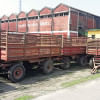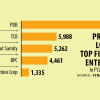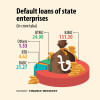Most state enterprises turned a profit. That was overshadowed by loss-makers

Three-fourths of state-owned enterprises (SOEs) in Bangladesh posted profits in July-April of the current fiscal year but their success has been dimmed by those in the red.
Out of 49 SOEs for which the financial data for the first 10 months of 2023-24 was available, 12 incurred combined losses of Tk 19,395 crore. The rest 38 firms logged profits of Tk 13,353 crore, according to the Bangladesh Economic Review 2024.
Of the successful SOEs, Bangladesh Petroleum Corporation logged the highest profit of Tk 4,875 crore. The Bangladesh Bridge Authority came second after netting Tk 3,163 crore while the Chittagong Port Authority registered a profit of Tk 1,881 crore.
The Land Port Authority, the Bangladesh Shipping Corporation, the Dhaka WASA, the Civil Aviation Authority of Bangladesh, the Bangladesh Export Processing Zones Authority, and the Bangladesh Economic Zones Authority also made hefty profits.
By contrast, the highest loss, at Tk 6,118 crore, was incurred by the Bangladesh Power Development Board (BPDB) in July-April of the fiscal year. Its provisional loss was Tk 11,163 crore in the full year of 2022-23.
The Trading Corporation of Bangladesh (TCB) witnessed a loss of Tk 6,033 crore while the Bangladesh Rural Electrification Board's (BREB) losses widened to Tk 4,499 crore. Bangladesh Chemical Industries Corporation reported a net loss of Tk 1,509 crore.
AB Mirza Azizul Islam, a former adviser to a caretaker government, said some of the SOEs are incurring losses because they lack good governance and accountability.
"They also lack efficiency. However, their top officials manage to retain their positions, and none holds them accountable. Possibly, there is corruption there too."
Owing to the massive losses, the government needs to inject liquidity into the companies by freeing up funds either from the revenue budget or the development budget, said Islam, who placed national budgets twice.
Among other companies, the loss of Bangladesh Sugar & Food Industries Corporation (BSFIC) was Tk 517 crore, the Bangladesh Jute Mills Corporation suffered losses of Tk 226 crore, the Bangladesh Inland Water Transport Authority's loss amounted to Tk 126 crore, and the Bangladesh Road Transport Corporation witnessed a loss of Tk 117 crore.
The Rural Development Academy, the Bangladesh Inland Water Transport Corporation, the Bangladesh Textile Mills Corporation, and the Bangladesh Film Development Corporation incurred losses in July-April, figures from the economic review showed.
The main reason for the loss of BPDB is it has to pay capacity charges, and the scarcity of natural gas has forced it to import liquefied natural gas in order to generate power, said Shameem Hasan, spokesperson of the state-run agency.
"Currently, we have no large power plant. Therefore, we need to import power. This also leads to losses."
The spokesperson also blamed the local currency depreciation for the loss.
"We will have to frame a long-term strategic plan to reduce the loss, and we are drawing up the plan."
Humayun Kabir, the spokesperson of the TCB, said the enterprise is selling many essential commodities at prices that are around 50 percent lower than the market rates.
"So, we have no other option but to secure funds from the government in the form of subsidy."
Currently, the TCB is selling goods at subsidised rates among one crore families.
According to Kabir, since the price increased, the subsidy also went up. "If the price drops, the loss may narrow."
An official of the BSFIC said almost all the sugar mills under the corporation are 60 years to 70 years old and their economic lifespan ended many years ago. "Modernisation of the mills is needed."
On the other hand, the cost of sugar production is higher than the going rate of the sweetener. "Therefore, we are making losses," he said, adding that the government wants to keep the mills operational so that the private sector can't dictate prices.
Mirza Azizul Islam recommended ensuring accountability at the SOEs so that they can make profits while giving services to the people.

 For all latest news, follow The Daily Star's Google News channel.
For all latest news, follow The Daily Star's Google News channel. 








Comments